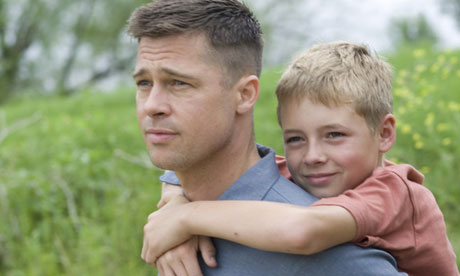 Father and son.
Father and son.
By immediate definition, "The Tree of Life" cannot really be considered as a film based on its lack of narrative, plenty of randomly befuddling visual spectacles and little to no dialogue. I think it's much apt to categorize the film strictly as a motion picture poetry piece whose reason for existence is not to be merely watched but to be experienced. "The Tree of Life" is pure esoteric cinema; a film that does not require narrative comprehension but emotional and psychological involvement. It explores life both in its simplicity down to its complex conception. It visually articulates both the world's creation and the very landscapes of the soul.
Given that "The Tree of Life" is a difficult watch much in the same way Gaspar Noe's "Enter the Void" is, it is a film conscious of its own awe-inspiring beauty and is also a strong meditative piece with enough sorrow and despair as it has hope and deliverance.
One of the things that I liked most about this film is how it has purely prioritized its metaphysical nature while at the same time gearing away from the A-list presence of both Brad Pitt and Sean Penn. For some, it's a perfect time to capitalize on these two actors' fame, but director Terrence Malick never did. Numerous times, there are even scenes where Pitt and Penn were shot from the neck down or over the shoulder. For Malick, at least from what I see, his vision is the film's real star, and considering the magnitude of what he's ambitiously trying to depict here in "The Tree of Life", everyone and everything must take the backseat.
But then, although the film will certainly be remembered as a deep-treading and almost psychedelic visionary work, it is finely balanced by a simple family drama in its middle part, with child actor Hunter McCracken delivering a beautifully realized performance as the Young Jack (Sean Penn's character), Jessica Chastain as the joyful, loving but vulnerable mother Mrs. O'Brien, and of course Brad Pitt in a surprisingly subtle turn as the father, Mr. O'Brien.
For some suckers for psychedelic visuals, a trait that was brilliantly displayed by the film in the beginning (with its "Discovery Channel-esque" visual representation of dinosaurs and some hammerhead sharks), they may think that the slightly plodding little drama inserted in the middle was there just to form a sense of dramatic coherence. I, for one, loved the middle part, but fleshing out such a segment then jumping back into the surrealistic, mind-numbing journey of metaphysical proportions later on may have cost the film some tonal consistency.
As the film returns to its phantasmagorical netherworld with whispering voices echoing some questions of existence, "The Tree of Life", instead of purely having the free-flowing feel of poetic filmmaking, has embraced a more patterned approach (Surreal visuals in the beginning, drama in the middle, surreal visuals yet again in the end), which resulted with the film having to separate its imagery into two fragmentary parts.
There really is no doubt regarding Terrence Malick's elegant audacity as a filmmaker, but "The Tree of Life", although a powerful film that holds within its hands an unhindered vision, is slightly inhibited in its otherwise successful attempt at cinematic bravery.
Given that "The Tree of Life" is a difficult watch much in the same way Gaspar Noe's "Enter the Void" is, it is a film conscious of its own awe-inspiring beauty and is also a strong meditative piece with enough sorrow and despair as it has hope and deliverance.
One of the things that I liked most about this film is how it has purely prioritized its metaphysical nature while at the same time gearing away from the A-list presence of both Brad Pitt and Sean Penn. For some, it's a perfect time to capitalize on these two actors' fame, but director Terrence Malick never did. Numerous times, there are even scenes where Pitt and Penn were shot from the neck down or over the shoulder. For Malick, at least from what I see, his vision is the film's real star, and considering the magnitude of what he's ambitiously trying to depict here in "The Tree of Life", everyone and everything must take the backseat.
But then, although the film will certainly be remembered as a deep-treading and almost psychedelic visionary work, it is finely balanced by a simple family drama in its middle part, with child actor Hunter McCracken delivering a beautifully realized performance as the Young Jack (Sean Penn's character), Jessica Chastain as the joyful, loving but vulnerable mother Mrs. O'Brien, and of course Brad Pitt in a surprisingly subtle turn as the father, Mr. O'Brien.
For some suckers for psychedelic visuals, a trait that was brilliantly displayed by the film in the beginning (with its "Discovery Channel-esque" visual representation of dinosaurs and some hammerhead sharks), they may think that the slightly plodding little drama inserted in the middle was there just to form a sense of dramatic coherence. I, for one, loved the middle part, but fleshing out such a segment then jumping back into the surrealistic, mind-numbing journey of metaphysical proportions later on may have cost the film some tonal consistency.
As the film returns to its phantasmagorical netherworld with whispering voices echoing some questions of existence, "The Tree of Life", instead of purely having the free-flowing feel of poetic filmmaking, has embraced a more patterned approach (Surreal visuals in the beginning, drama in the middle, surreal visuals yet again in the end), which resulted with the film having to separate its imagery into two fragmentary parts.
There really is no doubt regarding Terrence Malick's elegant audacity as a filmmaker, but "The Tree of Life", although a powerful film that holds within its hands an unhindered vision, is slightly inhibited in its otherwise successful attempt at cinematic bravery.








